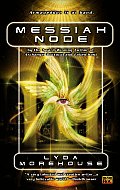
| Series: | AngeLINK #3 |
| Publisher: | Roc |
| Copyright: | June 2003 |
| ISBN: | 0-451-45929-6 |
| Format: | Mass market |
| Pages: | 342 |
This is the third book in the AngeLINK series, but the first that felt very series-like. Fallen Host was somewhat uncoupled from Archangel Protocol, but Messiah Node builds directly on both previous books. At this point in the series, you don't want to read out of order.
After a book following other threads entirely, Messiah Node opens by returning to Michael, Deidre, and Rebeckah. But this isn't a complete return to the style or characters of Archangel Protocol; Page, Mouse, Emmaline, and Morningstar all appear as well. There's a surfeit of viewpoint characters at times, giving the story something of a choppy and mid-book feel. A plot involving an unusually competent investigating Inquisitor (set off by the possibly miraculous destruction of the Dome of the Rock) is interwoven with fallout for Page from the concluding events of Fallen Host, fallout from Deidre's revelation near the end of Archangel Protocol, Mouse re-entering the world, and Rebeckah's past.
If this sounds like a lot to be going on at once, that captures my impression of the book: somewhat scattered and somewhat unfocused. For me, it also suffers from too much focus on Michael. I like Deidre, and Michael through her eyes is moderately interesting, but Michael through his own eyes is an angst vortex and somewhat tedious reading. The Mouse bits are interesting; the Page bits somewhat less so, since they also slip into some of the stock imagery of cyberpunk combat, which I found uninspired. And there's not much in the way of resolution on offer here. The world seems to be slipping closer towards Armageddon, but the events of this book seem to be setup, side plots, or just general thrashing about. I quite enjoyed some individual bits (Rebeckah and Thistle's difficult relationship, for example), but I was missing underlying structure on which to organize the events.
That said, Morehouse does an excellent job of development of setting. While reading this book, I was also catching up on Slactivist and the line-by-line dissection of the Left Behind series, and comparison to the pathetic efforts of LaHaye and Jenkins make it obvious how much better Morehouse handles the possible run-up to Armageddon. The excerpts from news sources at the end of each chapter are back in this book and used to excellent effect, developing the world context around and underneath the plot. Even without a Rapture, considerably more impact on day-to-day life is already apparent. The destruction of the Dome of the Rock leads to expected military confrontation, people start interpreting obscure Biblical prophecies of Gog and Magog and mapping them to world events in dangerous and aggressive ways, there are mass suicides and financial panics, and one can feel the chaos and tension levels rise throughout the book. Morehouse's setting rings very true for her world of hyper-religious fervor. It provides both a constant ambiguity about whether prophecies are real or self-fulfilling and also an underlying chaos for more cynical characters to exploit and manipulate. This is the sort of chaos that seems realistic given the premise of the end times.
This is still a good book, but it's a fractured book, and it's less satisfying than the earlier books in the series. I like most of the characters, but a few that I don't like became tedious. I wish the plot had the same energy as the world background, and I wish the cyberpunk aspects had maintained the same level of creativity as Fallen Host. But if you enjoyed the previous books in this series, I would keep reading.
Followed by Apocalypse Array.
Reviewed: 2010-10-24